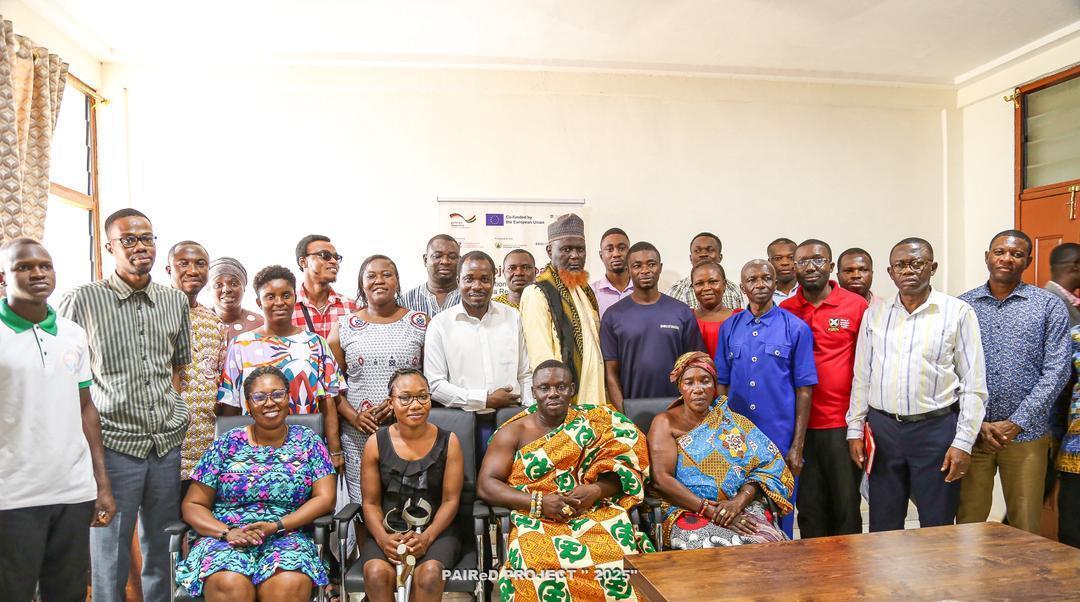Africa-Press – Ghana. Governmental Organisation, has launched the implementation of a new governance project to enhance transparency, accountability, and citizen participation in the Bono and Ahafo regions.
Established in 2003, the foundation commits to providing public health education, provision of consultancy services for hygiene and sanitation promotion, consultancy services for sustainable rural water and sanitation, social and organizational development intervention to communities.
Titled: “Social Accountability for a Resilient Democracy (SARD)”, the project is an initiative of the Participation, Accountability and Integrity for a Resilient Democracy (PAIReD) programme, commissioned by the German Federal Ministry for Economic Cooperation and Development (BMZ).
It is co-funded by the European Union (EU) and the Swiss State Secretariat for Economic Cooperation (SECO), and implemented by GIZ in cooperation with Ghana’s Ministry of Finance.
It seeks to build the capacity of public institutions to deliver citizen-oriented and trustworthy governance mainly at the local levels.
The SARD project will further empower citizens with increased knowledge to actively participate in local governance and demand accountability from local state officials.
Speaking at the launch of the project implementation at Duayaw-Nkwanta, the Tano North Municipal capital of the Ahafo region, Mr Thomas Benarkuu, the Deputy Chief Executive Officer (CEO) of MIHOSO, explained that the first phase of the SARD project was being rolled out in five districts and municipalities in the two regions.
They comprise Sunyani West municipality, and Dormaa West district in the Bono region as well as Asutifi North and Asunafo South districts and Tano North municipality of the Ahafo region.
The launch was attended by the traditional authorities, the Ghana Federation of Disability Organisations (GFDO) and some community members and other key stakeholders.
Mr Benarkuu explained that the initiative had been designed to increase the revenue mobilisation of the district assemblies by at least 40 percent as well as improving citizens’ awareness of their respective assemblies’ activities and planning processes.
He said: “This project will strengthen participatory dialogue, promote transparency in public finance management, and enhance monitoring of local projects through Social Audit Committees as watchdogs over district programmes and plans.
“We expect it to improve social accountability at the grassroots and reinforce the role of Client Service Units and Public Relations and Complaints Committees in reporting and feedback mechanisms,” he added.
Mr Benarkuu called on stakeholders, like the traditional authorities, civil society organisations, and citizens, to support and to make the implementation of the project achieve desirable outcomes.
Mr Eric Adomako, the Tano North Municipal Coordinating Director, pledged the Assembly’s commitment to support the successful implementation of the project, describing the initiative as a timely intervention to improve accountability and service delivery.
“The Assembly will also give its maximum backing to the SARD project as it will help us strengthen transparency and improve service delivery,” he stated.
Nana Yaw Nkrumah, the Chief of Bredi in the Duayaw-Nkwanta Traditional Area, lauded the project implementation and stressed the commitment of the chiefs and queens to support it.
He urged the assembly members to remain transparent and accountable in their dealings with their constituents.
In a highlight, Mr Godfred Wuliyeng, the Head of Programme at MIHOSO, said activities like baseline surveys, accountability forums, town hall meetings, community dialogues, quarterly reviews, and validation sessions would be undertaken to ensure the successful implementation of the project.
He said: “These engagements will create platforms for citizens to demand accountability from their leaders while strengthening trust in public institutions,” and expressed the optimism that the initiative would foster transparency, enhance participatory governance, and contribute to building a more resilient democracy.
Mr Wuliyeng said the overarching goal of the SARD project was to empower citizens to engage meaningfully in local governance and hold duty-bearers accountable as well.
For More News And Analysis About Ghana Follow Africa-Press







